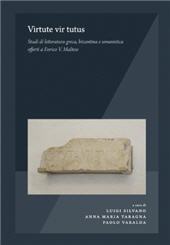Tra metafora e reificazione : la critica "graffiante" di Eschilo ai prologhi euripidei nelle Rane di Aristofane
P. 237-256
This paper demonstrates how the little oil flask evoked in the Frogs' agon by the famous refrain ληκύθιον ἀπώλεσεν ends up being comically reified, and how this reification helps to better interpret v. 1227-36. The oil flask recalls the athletes' habit of anointing their skin with oil before exercising or competing: not doing so exposed them to the risk of chafing and lacerations. The surreal subtext of the scene is that, due to the alleged loss of the lekythion by Euripides' characters, his prologues are undergoing an abrasive action by Aeschylus' criticism. Forcing the possibilities that language offers him to an absurd degree, Aristophanes here exploits the ambiguity of the verb διακναίω, which can be understood both literally and metaphorically. The groundwork for this wordplay is skillfully laid in the previous lines of the dialogue by the occurrence of other verbs of rubbing or skinning (ἀναδέρω, κνίζω, βασανίζω) all metaphorically related to literary criticism. [Publisher's text]
Fait partie de
Virtute vir tutus : studi di letteratura greca, bizantina e umanistica, offerti a Enrico V. Maltese. - ( Colibri ; 4)-
Chapitres du même volume (disponibles individuellement)
-
Informations
ISBN: 9789464753127


